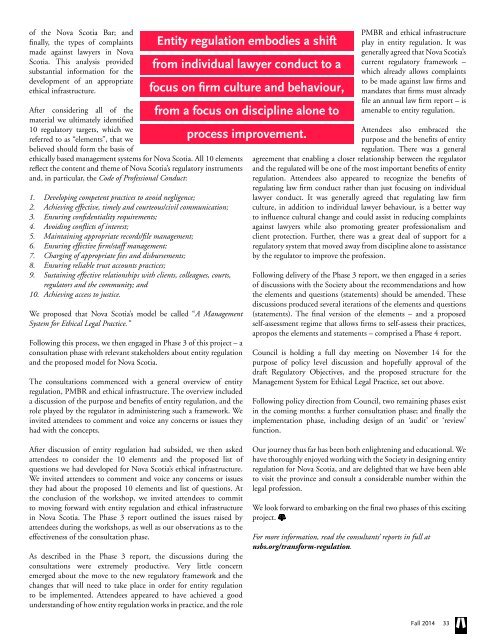11eApYW
11eApYW
11eApYW
You also want an ePaper? Increase the reach of your titles
YUMPU automatically turns print PDFs into web optimized ePapers that Google loves.
of the Nova Scotia Bar; and<br />
finally, the types of complaints<br />
made against lawyers in Nova<br />
Scotia. This analysis provided<br />
substantial information for the<br />
development of an appropriate<br />
ethical infrastructure.<br />
After considering all of the<br />
material we ultimately identified<br />
10 regulatory targets, which we<br />
referred to as “elements”, that we<br />
believed should form the basis of<br />
ethically based management systems for Nova Scotia. All 10 elements<br />
reflect the content and theme of Nova Scotia’s regulatory instruments<br />
and, in particular, the Code of Professional Conduct:<br />
1. Developing competent practices to avoid negligence;<br />
2. Achieving effective, timely and courteous/civil communication;<br />
3. Ensuring confidentiality requirements;<br />
4. Avoiding conflicts of interest;<br />
5. Maintaining appropriate records/file management;<br />
6. Ensuring effective firm/staff management;<br />
7. Charging of appropriate fees and disbursements;<br />
8. Ensuring reliable trust accounts practices;<br />
9. Sustaining effective relationships with clients, colleagues, courts,<br />
regulators and the community; and<br />
10. Achieving access to justice.<br />
We proposed that Nova Scotia’s model be called “A Management<br />
System for Ethical Legal Practice.”<br />
Following this process, we then engaged in Phase 3 of this project – a<br />
consultation phase with relevant stakeholders about entity regulation<br />
and the proposed model for Nova Scotia.<br />
The consultations commenced with a general overview of entity<br />
regulation, PMBR and ethical infrastructure. The overview included<br />
a discussion of the purpose and benefits of entity regulation, and the<br />
role played by the regulator in administering such a framework. We<br />
invited attendees to comment and voice any concerns or issues they<br />
had with the concepts.<br />
Entity regulation embodies a shift<br />
from individual lawyer conduct to a<br />
focus on firm culture and behaviour,<br />
from a focus on discipline alone to<br />
process improvement.<br />
PMBR and ethical infrastructure<br />
play in entity regulation. It was<br />
generally agreed that Nova Scotia’s<br />
current regulatory framework –<br />
which already allows complaints<br />
to be made against law firms and<br />
mandates that firms must already<br />
file an annual law firm report – is<br />
amenable to entity regulation.<br />
Attendees also embraced the<br />
purpose and the benefits of entity<br />
regulation. There was a general<br />
agreement that enabling a closer relationship between the regulator<br />
and the regulated will be one of the most important benefits of entity<br />
regulation. Attendees also appeared to recognize the benefits of<br />
regulating law firm conduct rather than just focusing on individual<br />
lawyer conduct. It was generally agreed that regulating law firm<br />
culture, in addition to individual lawyer behaviour, is a better way<br />
to influence cultural change and could assist in reducing complaints<br />
against lawyers while also promoting greater professionalism and<br />
client protection. Further, there was a great deal of support for a<br />
regulatory system that moved away from discipline alone to assistance<br />
by the regulator to improve the profession.<br />
Following delivery of the Phase 3 report, we then engaged in a series<br />
of discussions with the Society about the recommendations and how<br />
the elements and questions (statements) should be amended. These<br />
discussions produced several iterations of the elements and questions<br />
(statements). The final version of the elements – and a proposed<br />
self-assessment regime that allows firms to self-assess their practices,<br />
apropos the elements and statements – comprised a Phase 4 report.<br />
Council is holding a full day meeting on November 14 for the<br />
purpose of policy level discussion and hopefully approval of the<br />
draft Regulatory Objectives, and the proposed structure for the<br />
Management System for Ethical Legal Practice, set out above.<br />
Following policy direction from Council, two remaining phases exist<br />
in the coming months: a further consultation phase; and finally the<br />
implementation phase, including design of an ‘audit’ or ‘review’<br />
function.<br />
After discussion of entity regulation had subsided, we then asked<br />
attendees to consider the 10 elements and the proposed list of<br />
questions we had developed for Nova Scotia’s ethical infrastructure.<br />
We invited attendees to comment and voice any concerns or issues<br />
they had about the proposed 10 elements and list of questions. At<br />
the conclusion of the workshop, we invited attendees to commit<br />
to moving forward with entity regulation and ethical infrastructure<br />
in Nova Scotia. The Phase 3 report outlined the issues raised by<br />
attendees during the workshops, as well as our observations as to the<br />
effectiveness of the consultation phase.<br />
As described in the Phase 3 report, the discussions during the<br />
consultations were extremely productive. Very little concern<br />
emerged about the move to the new regulatory framework and the<br />
changes that will need to take place in order for entity regulation<br />
to be implemented. Attendees appeared to have achieved a good<br />
understanding of how entity regulation works in practice, and the role<br />
Our journey thus far has been both enlightening and educational. We<br />
have thoroughly enjoyed working with the Society in designing entity<br />
regulation for Nova Scotia, and are delighted that we have been able<br />
to visit the province and consult a considerable number within the<br />
legal profession.<br />
We look forward to embarking on the final two phases of this exciting<br />
project.<br />
For more information, read the consultants’ reports in full at<br />
nsbs.org/transform-regulation.<br />
Fall 2014 33


